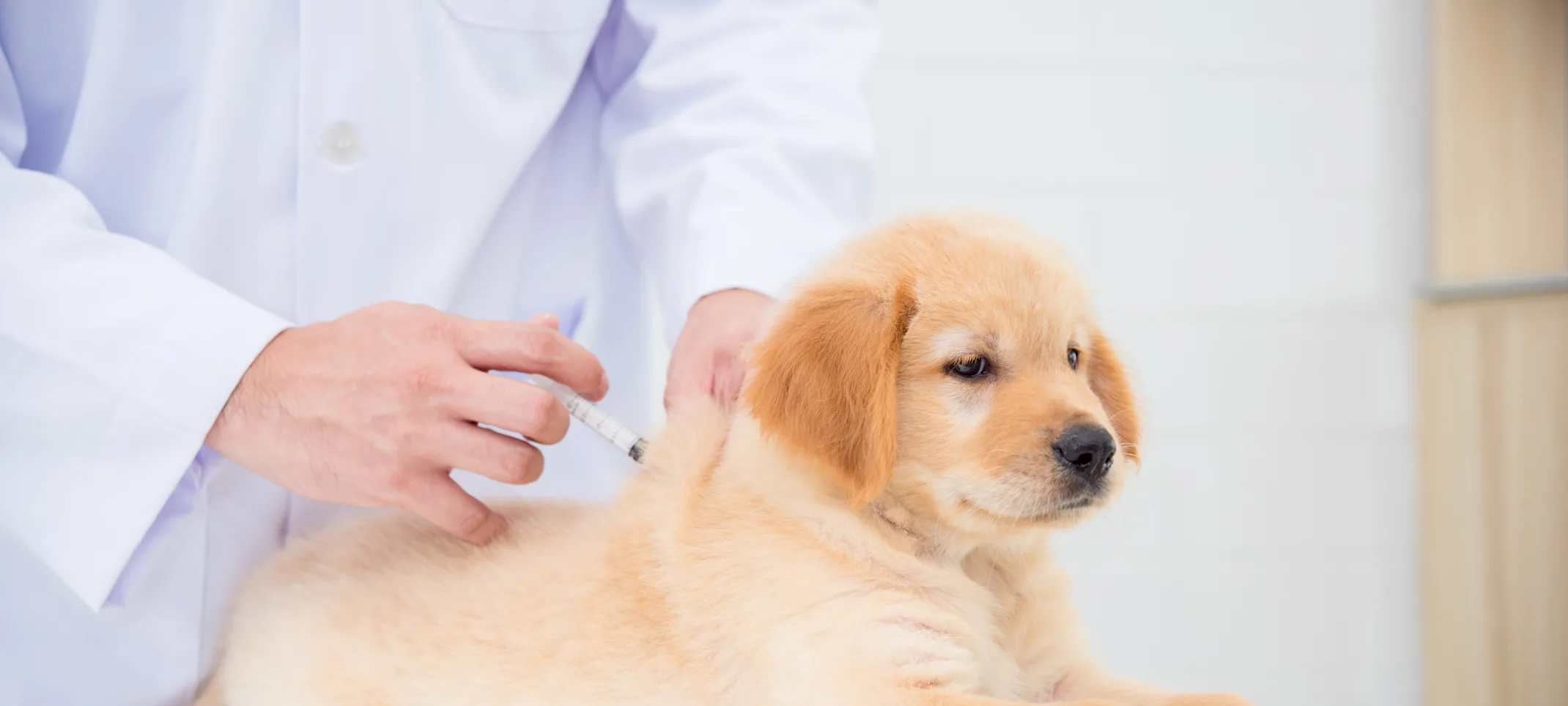Pet's Friend Animal Clinic
Canine Vaccines
Preventative care is an important aspect in maintaining your dog's health. Proper vaccination is vital in protecting them against harmful diseases.

Rabies
Rabies is a virus that may affect the brain and spinal cord of all mammals, including dogs, cats and humans. Though preventable, there is good reason that the word “rabies” evokes fear in people. The disease has been reported in every state except Hawaii, and everywhere throughout the world except for Australia and Antarctica. Annually, rabies causes the deaths of more than 50,000 humans and millions of animals worldwide. Once symptoms appear, the disease results in fatality.
Unvaccinated dogs who are allowed to roam outdoors without supervision are most at risk for infection. If they’re exposed to wild animals, they have a greater chance of fighting with infected stray or wild animals. There is no accurate test to diagnose rabies in live animals. The direct fluorescent antibody test is the most accurate test for diagnosis--but because it requires brain tissue, it can only be performed after the death of the animal. There is no treatment or cure for rabies once symptoms appear. Since rabies presents a serious public health threat, animals that are suspected of having the virus are most often euthanized.
Vaccinating your pet not only protects them from getting rabies, it protects them if they bite someone. Dogs that have bitten humans are required to be confined for at least 10 days to see if rabies develops, and if the animal’s vaccination records are not current, a lengthy quarantine or even euthanasia may be mandated. In California, Rabies vaccination is required by law for dogs by the age of 6 months. Avoiding contact with wild animals is also necessary to prevention. You may greatly decrease chances of rabies transmission by walking your dog on a leash, and supervising him while he’s outdoors.
At Pet’s Friend Animal Clinic, We use the Merial Imrab® 3TF killed virus vaccine. Legally, we can give puppies their first Rabies vaccine at 16 weeks of age. They will then need a booster one year following their initial vaccine, then every 3 years after that.
Bordetella
Kennel Cough is a form of bronchitis that is similar to a chest cold in humans but can be caused by a virus or bacteria. It causes inflammation of a dog’s windpipe (trachea) and voice box, and though it usually clears up on its own, kennel cough is extremely contagious. In some serious cases, kennel cough can lead to pneumonia if left untreated.
A dry cough with a ‘honking’ or ‘throat-clearing’ sound is the most classic symptom. Sometimes coughing can even be followed by some gagging and white-foamy phlegm- these signs are often exacerbated after activity or pulling while on a neck-lead. It is not uncommon for dogs to also develop a fever and/or nasal discharge. Keep in mind that in many cases your dog’s appetite and energy level may not change or reflect sickness.
Kennel Cough Is Very Contagious
Kennel cough can be caught in many ways. It can spread directly from dog to dog, or through germs on contaminated objects. Kennel cough is often spread in enclosed areas with poor air circulation—Examples include: boarding in a kennel or an animal shelter, or through direct contact while sitting in a training class, vaccine clinic, or grooming facility. Young and unvaccinated dogs are also at higher risk.
Kennel cough is so contagious that your dog could even catch it from sharing a water dish or toy at the dog park or by simply greeting another dog. Most boarding facilities, including Pet’s Friend Animal Clinic, will not board your pet without proof of a recent Bordetella vaccination.
Kennel Cough Exam
If your dog is coughing and/or you suspect they have kennel cough, immediately isolate them from all other dogs and call Pet’s Friend Animal Clinic to schedule an appointment with your veterinarian. When you arrive for your dog’s appointment, keep them in the car until you have checked in and can go directly into an exam room to minimize exposure to other pets.
Preventing Kennel Cough
The best way to prevent kennel cough is to prevent exposure. Vaccinations are also available for several of the agents known to be involved in kennel cough, including parainfluenza, bordetella and adenovirus-2. At Pet’s Friend Animal Clinic we can give your dog their vaccine in any of the following two ways: intranasal or subcutaneously. Intranasal is the most common route the vaccine is given and can be given to puppies as young as 3 weeks of age. Generally, we recommend that every dog is vaccinated to prevent kennel cough.
DHPP 4-in-1 Vaccine
Distemper (CDV)
This is a very contagious, incurable, and often fatal disease that attacks the gastrointestinal tract, respiratory system, and most devastatingly, the central nervous system. Occurrences of canine distemper are less common today due to the advent of effective vaccines. Unfortunately, puppies and unvaccinated adult dogs are most susceptible to infection.
Adenovirus (CAV-2) and Parainfluenza
Along with Bordetella and parainfluenza, canine adenovirus type 2 (CAV-2) is one of the reasons dogs get kennel cough. Adenoviruses are spread directly from dog to dog through infected respiratory secretions or by contact with contaminated feces or urine. Coughing and gagging accompanied by a fever, runny nose, or red, watery eyes are the most common symptoms. And though the disease typically runs its course without long term effects, it can lead to a more serious infection
Parvovirus Vaccine Information
Parvovirus is a viral disease that is extremely contagious, can produce a life-threatening illness, and can be transmitted by any person, animal or object that comes in contact with an infected dog's feces. Parvovirus primarily affects the intestines, but it also attacks the white blood cells. When young animals are infected, the virus can damage the heart muscle and cause lifelong cardiac problems. Highly resistant, the virus can live in the environment for months, and may survive on inanimate objects such as food bowls, shoes, clothes, carpet and floors. It is common for an unvaccinated dog to contract parvovirus from the streets, especially in urban areas where there are many dogs.
Parvovirus can be diagnosed by your veterinarian here at Pet’s Friend Animal Clinic if your dog is presenting symptoms. The most common Parvo test can be performed in about 15 minutes using a small stool sample. Because the test is not always 100% sensitive or specific, your veterinarian may recommend additional blood work or testing. Puppies, adolescent, and unvaccinated dogs are most susceptible to the virus.
The most common symptoms of Parvovirus include lethargy, loss of appetite, severe vomiting, and bloody foul-smelling diarrhea that can lead to life threatening dehydration. You can protect your dog from this horrible virus by making sure all vaccinations are up-to-date. Parvovirus is considered a core vaccine for all puppies and adult dogs here at P.F.A.C. It is usually recommended that puppies be vaccinated with combination vaccines that take into account the risk factors for exposure to various diseases. One common vaccine, called a “4-in-1/DHPP,” protects the puppy from distemper, hepatitis (adenovirus), parvovirus and parainfluenza. Puppies need boosters at 3-4 week intervals for adequate protection up to 16-18 weeks of age.
Because parvovirus can live dormant in an environment for months or even up to 2 years, you will want to take extra care if there has been an infected dog in your house or yard. Some things are easier to clean and disinfect than others—and even with excellent cleaning, parvovirus can be difficult to eradicate. Parvo is resistant to many typical disinfectants. A solution of one part bleach to 32 parts water can be used where organic material is not present. The infected dog’s toys, food dish and water bowl should be properly cleaned and then disinfected with this solution for 10 minutes. If not disinfected, these articles should be discarded. You can also use the solution on the soles of your shoes if you think you've walked through an infected area. Areas that are harder to clean (grassy areas, carpeting and wood, for example) may need to be sprayed with disinfectant, or even resurfaced.
Leptospirosis
Leptospirosis is a kind of bacteria that doesn’t die instantly in urine. It is spread in the urine directly, through bite wounds or with the ingestion of infected meat. It can be indirectly transmitted through infected water, soil and plant material.
Usually there are no symptoms because the disease progresses so quickly or it can linger chronically causing minimal problems until it is too late. When an animal contracts Leptospirosis, they have signs of lethargy, fever, vomiting and not eating. Their blood work can show that they have both kidney failure and concurrent liver problems.
The disease can be treated with very aggressive and potentially expensive therapy, including fluid therapy and antibiotics. In areas where available, kidney dialysis is sometimes recommended. The early stages may be treated with antibiotics, but the disease is rarely diagnosed in this phase. Unfortunately, the animal may have residual kidney and liver problems for life. Leptospirosis is common in the urine of raccoons, rats, and deer.
Dogs who roam freely in damp areas like wet, rainy pastures known to be inhabited by wildlife or livestock are at risk. Also, dogs that are exposed to rodent urine (possibly in a home or barn) are at risk.
Puppies with the potential for exposure should receive two doses of the killed or subunit Leptospirosis vaccine (canine) against the 4 most common serovars (L. canicola, L. icterohemorrahgica, L. pomona and, L. grippotyphosa,) in conjunction with their other puppy vaccines. They receive a booster at one year and then annually.
For more information, please feel free to call Pet's Friend Animal Clinic about any questions or concerns you may have at 408-739-2688.
